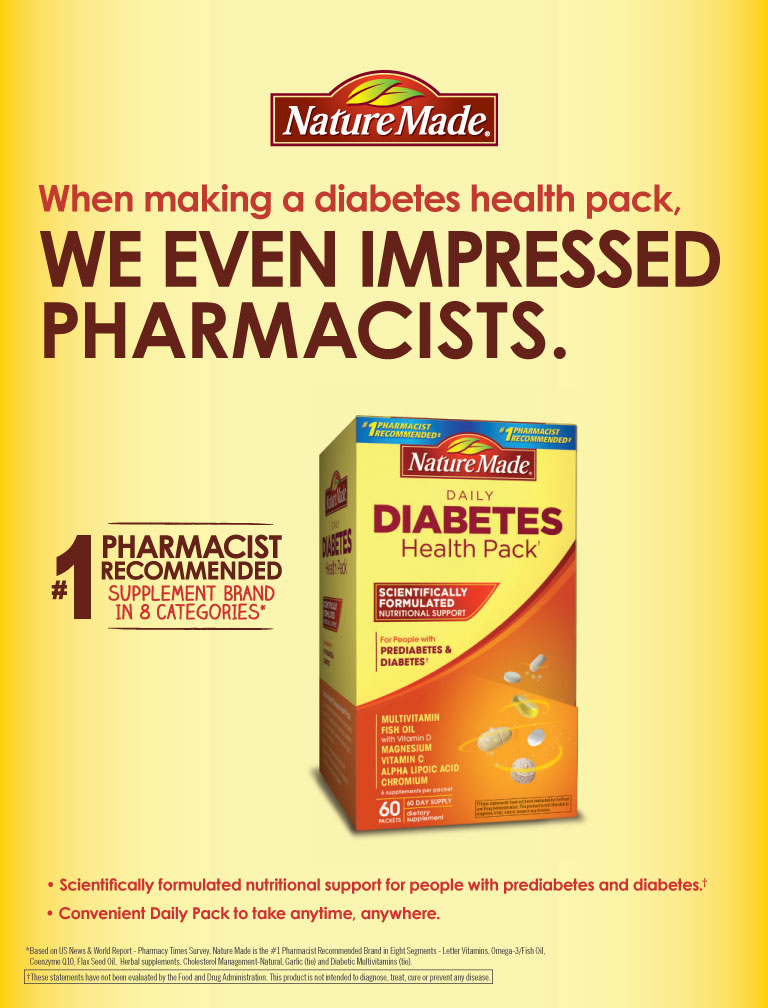First, it is important to note that eating a variety of whole foods is a better choice for staying healthy than relying on vitamins or supplements. Eating lean meats, vegetables, fruits, and whole grains- and limiting fats and sugar — are important for keeping your blood glucose under control.
Individual foods can give you many different vitamins, minerals, and nutrients, in one serving. For example, raspberries contain vitamin C, fiber, and antioxidants. These nutrients, plus all the food nutrients we have not yet discovered, work together in your body to ensure that you benefit from all of them. Using vitamins or supplements – which do not have the full range of nutrients that whole foods do — may not be needed unless you have a specific vitamin deficiency. (“Deficiency” means that your body does not have enough of an important nutrient.) It’s a good idea to talk to your healthcare provider before taking any vitamin supplements to see if you really need them.
Your healthcare provider may want you to take vitamin supplements if you are:
- On a low-calorie diet and do not eat a wide variety of foods
- On a vegan diet (no meat, fish, eggs or dairy products)
- Pregnant
- On a restricted diet because you have food allergies, kidney disease or have trouble absorbing nutrients
What Vitamins Are The Best?
Many people, including those with diabetes, may need to take vitamin D supplements. Experts say to take 400 international units (IU) each day. Recent studies suggest that this may not be enough vitamin D. Ask your healthcare provider if you should take vitamin D supplements, and how much to take every day.
Why Is Vitamin D So Important For Good Health?
Vitamin D might be able to:
- improve pain and tingling in your legs, feet, hands, and fingers.
- keep bones healthy and strong
- help with blood glucose control
- help ease depression in women with type 2 diabetes.
How Can I Get More Vitamin D?
-
Go outside in the sunshine. Sunshine is a great way to get vitamin D. To be safe, first check with your healthcare provider to make sure it’s safe for you to spend time in the sun.
- Eat more fish and egg yolks.
- Eat cereals with vitamin D added.
- Drink milk with vitamin D added.
- Take Vitamin D supplements if your healthcare provider recommends it.
- Vitamin D and calcium work together. Ask your healthcare provider if it’s a good idea for you to take Vitamin D with a calcium supplement.
What about Chromium, and Vitamins C and E?
There are some studies showing that these nutrients might be helpful for blood glucose control or heart health, but more research is needed. News stories over the past few years have reported that chromium might decrease body fat and build muscle without you having to change your eating habits. But, studies have not shown that chromium helps you lose weight. Also, it is not known how much chromium you should take. Fortunately, it is relatively safe. In fact, many healthcare providers tell their patients with diabetes to take chromium supplements. However, don’t take a chromium supplement without first talking with your healthcare team and knowing the correct amount to take. You might damage your kidneys if you take too much chromium. Good food sources of chromium include whole grains, bran cereals, seafood, green beans, nuts, peanut butter, and potatoes.
People with diabetes may have lower levels of vitamin C in their bodies. This may be because higher blood glucose levels keep vitamin C out of the body’s cells. In one study, people with type 2 diabetes who took 2,000 mg of Vitamin C every day showed improvement in blood glucose and fat levels. However, more studies need to be done to confirm the benefits for people with diabetes so ask your healthcare provider first before taking vitamin C supplements. Some studies say that vitamin E might help prevent health problems such as heart disease, eye problems and kidney damage. However, it’s too early to know if this is true. In addition, experts are not sure how much vitamin E you should take. Vitamin E amounts greater than 800 IU each chance of stroke in people with high blood pressure. Too much vitamin E can also keep medicines that prevent blood clots from working. If you want to take vitamin E, ask your healthcare provider first about the pros and cons and if you do decide to take vitamin E, do not take more than 200
Tips for Taking
Supplements
- Pick supplements with no more than 100 to 150 percent of the daily value for the listed vitamins and minerals
- Women who have gone through menopause should choose a supplement without iron
- Choose a brand that has the USP seal on the package. A USP (U.S. Pharmacopeia) seal says the product has been tested for strength and purity
- Check expiration dates; do not use expired supplements
- Keep supplements in a cool, dry place, and out of reach of children.


